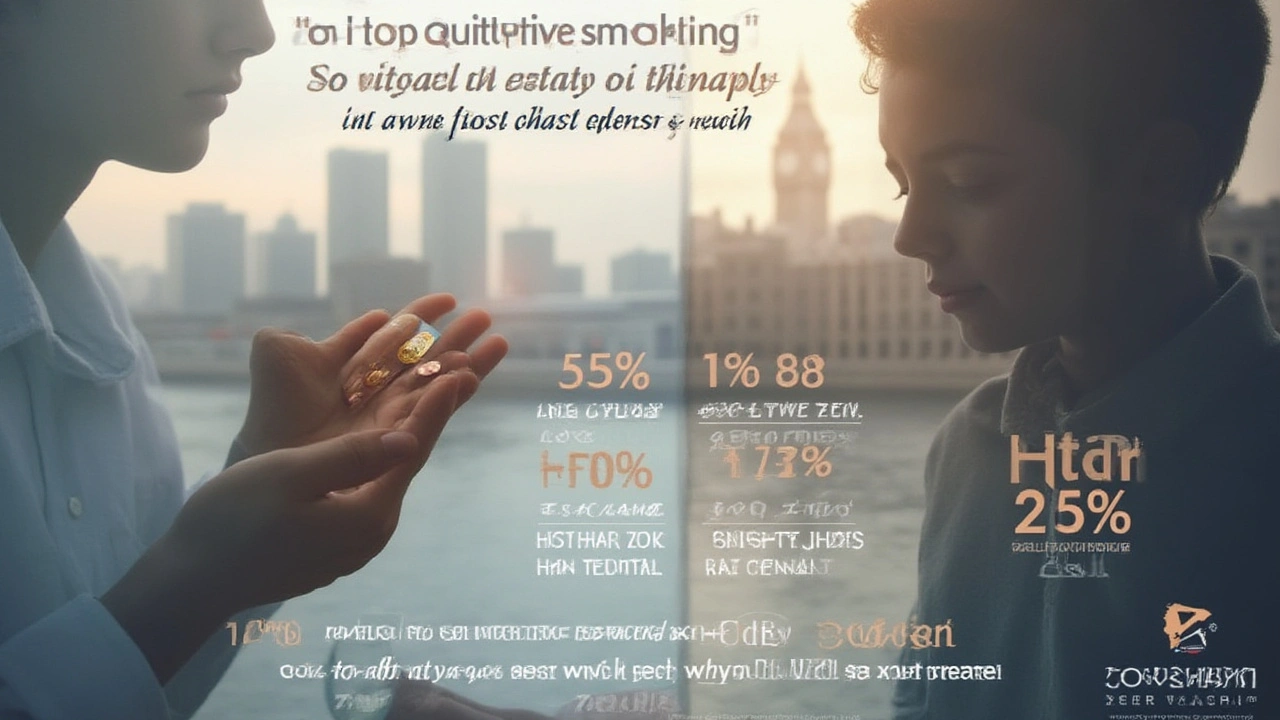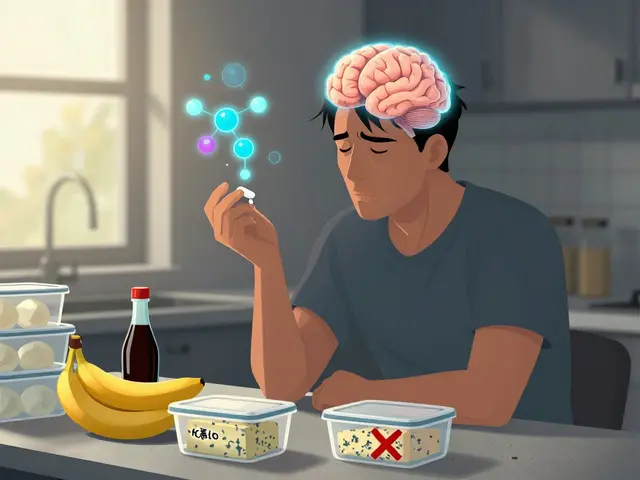Light up a room with a cigarette in your hand, and someone will almost always tell you to quit. People toss around advice like confetti, but what about solutions that actually work? Zyban is one of those under-the-radar options that’s been quietly helping smokers quit for decades, yet a surprising number of people have never heard of it. Even if you’ve tried quitting more times than you can count, there’s a really good chance you haven’t faced your cravings with the help of this little-known pill. The real buzz: Zyban doesn’t replace nicotine like a patch or gum—it tackles the brain chemistry behind addiction itself. Let’s peel back the layers on what Zyban actually does, why doctors keep recommending it, and what makes it stand out in the sea of stop-smoking aids.
What is Zyban and How Does it Work?
Ask ten smokers their plan to quit, and you get ten different answers. Some swear by cold turkey, others try nicotine gum, and a bold few stock up on patches or fancy vape pens that promise nothing but a new habit. But lurking in your pharmacy is an option that’s taken a totally different approach: Zyban. Also known in the pharmacy world as bupropion, this prescription tablet came onto the scene for depression in the 90s, but a funny thing happened—patients taking it were losing interest in cigarettes. The connection was too strong to ignore. Researchers dug into it and, by 1997, the FDA gave Zyban the green light as a quit-smoking aid.
The magic of Zyban isn’t magic at all—it’s about brain chemistry. Here’s how it works, in plain English: Smoking makes your brain release dopamine and norepinephrine. That’s why you get those little bursts of pleasure and stress release. Zyban jacks up your natural levels of both these chemicals, so when you quit, the crash isn’t so brutal. There’s no nicotine in it. No smoke. Just a pill you swallow, usually once or twice a day. The real trick is starting Zyban a week or two before you actually quit, so it has time to work its chemistry magic before you put out your last cigarette.
If you’re wondering about how well this really works, studies have some numbers to back it up. One clinical trial in the New England Journal of Medicine showed that almost twice as many people quit with Zyban compared to a placebo after seven weeks (30% versus 16%). Not everyone hits the jackpot, but the odds are a heck of a lot better than white-knuckling it with nothing. Doctors sometimes add nicotine patches to Zyban if a patient’s cravings run wild, but researchers say Zyban alone can get results that rival most nicotine replacement therapies—without actually feeding the addiction cycle.
The puzzle: Why doesn’t everyone go for this? Honestly, awareness is a big barrier. Most folks know about nicotine gum but have no idea their doctor can hand them a prescription for something that changes the quit-game from inside the brain itself. Also, Zyban is prescription-only, which adds that tiny extra hurdle. But for those struggling with cravings that feel like they stab you out of nowhere or who’ve tried other things without luck, this pill might be the hidden ace.
| Quit Aid | Contains Nicotine? | Prescription? | Success Rate (%) at 12 weeks |
|---|---|---|---|
| Zyban | No | Yes | ~30-35 |
| Nicotine Patch | Yes | No | ~17-25 |
| Nicotine Gum | Yes | No | ~15-20 |
| Cold Turkey | No | No | ~3-7 |
The numbers tell their own story. Zyban can just about double your odds compared to quitting with willpower alone or using over-the-counter nicotine stuff. But the game isn’t just about the pill. There’s more to watch for, and that’s what the next section is all about.

Zyban Side Effects, Safety, and Who Should Avoid It
Pop any pill—and yes, even the everyday ones like Tylenol or Advil—and there’s always a chance of an unwanted reaction. Zyban is no different. It does a clever job with brain chemicals, but that also means your body might twitch at the changes or push back in ways you didn’t see coming.
Let’s get the most common stuff out of the way first. Dry mouth? About one-third of users notice their tongue sticking to the roof of their mouth more often. It’s annoying but usually not deal-breaking. Trouble sleeping is another one—up to 40% lose a bit of shuteye. Some deal with headaches, nausea, a feeling of being a little jittery, or changes in appetite. These could fade after a few weeks, but if you’re not sleeping, that can make the stress of quitting even worse.
There’s also a more serious side of the coin, and it’s one you can’t ignore. Zyban, like its cousin Wellbutrin (same drug, different branding), ups the risk of seizures. For the general public, it’s a very low risk—about 1 in 1,000 people. Still, that’s why doctors ask about your medical history before waving a prescription pad. If you have a history of seizures, an eating disorder like bulimia or anorexia, or you drink a heavy amount of alcohol, the risk climbs. The pill isn’t for everyone, and women who are pregnant or breastfeeding should check twice with their doc before even thinking about it.
Mental health is another key point. A tiny number of people report mood swings, depression, or suicidal thoughts on Zyban, mainly if they struggled with these issues before. That’s one reason why everyone’s supposed to have a check-in appointment after starting. If things feel off—like your mood tanks for no clear reason from day to day—let your doctor know fast. They want to hear from you rather than read it in your health record down the line.
Strangely, some people report feeling extra alert, more energized, and even a little happier. That’s what made Zyban successful for depression in the first place, and for some, it’s a helpful side effect in the foggy world of quitting. A lot of people find food cravings get less intense too, so the old weight-gain fear after quitting doesn’t always come true like grandma said it would.
If you’re a combo plate of risk factors—say, someone who drinks a bit more than socially, has epilepsy in the family, or popped an eating disorder diagnosis in the past—Zyban probably isn’t the right fit. But if you’re relatively healthy but just stuck with a very stubborn craving, it’s still somewhere in your quit-smoking toolkit. Also, it’s a good move to give your doctor a list of every supplement and medicine you’re on, since bupropion can tangle up with other meds like some antidepressants, antipsychotics, or even a few antibiotics.
Worried about addiction? The good news: Zyban is not habit-forming. There’s no withdrawal when you stop it, no strong urge to pop another pill. Most people use it for about seven to twelve weeks, then taper off with a doctor’s call. A few need it longer, but the main idea is not to swap one habit for another. Zyban is about getting off cigarettes, not jumping into another dependency loop.
Another quick fact: If you’re trying for a baby or planning to breastfeed, Zyban’s safety isn’t totally clear. Small amounts can pass into breast milk, so doctors usually suggest other quitting options in those scenarios. Kids and teens aren’t the audience for Zyban, either—it’s for adults only.
Thinking about costs? Prescription prices vary, but insurance often covers Zyban as a stop-smoking aid, especially if you ask your doctor to code it that way. If insurance laughs at you, pharmacies sometimes offer discount cards, and manufacturers toss out coupons on occasion. Either way, the cost usually beats a month’s worth of cigarettes, especially with today’s prices climbing higher than ever.

How to Maximize Quit Success with Zyban: Tips from Real Users and Experts
So you got your hands on a bottle of Zyban. Now what? You’ve still got to battle the routines, the stress triggers, that morning coffee that just doesn’t taste the same without a smoke. Nobody can promise you a magic fix, not even a prescription. But seasoned quitters and the docs who’ve watched thousands make it out of the other side have picked up some seriously good advice. Ready for the best of it?
- Start before your quit date: Zyban needs about seven to fourteen days to build up in your system. That means you keep smoking as usual for the first week, then pick your quit day as Zyban kicks into gear.
- Don’t go at it alone. Behavioral support (think quit groups, hotlines, or even texting a friend) bumps up your odds a lot. People using Zyban along with weekly check-ins succeeded more than twice as often in some studies, so bring in your team.
- If cravings get insane, don’t be afraid of using a nicotine patch or lozenge alongside Zyban—but only after checking in with your doctor. Sometimes the combined approach is what gets you across the finish line.
- Prepare for hiccups. The urge might spike at parties, at work stress moments, or after meals. Planning ahead—a quick walk, sugar-free mints, or fiddling with anything but a lighter—gives your hands and brain something to do.
- Side effects showing up? Dry mouth is the most common. Keep a bottle of water handy, and sugarless gum can help too. For sleep issues, try taking Zyban early in the day—morning and afternoon—rather than right before bed.
- Feel different? Some folks find moods shift. Don’t ignore a blue spell. Jot down what you’re feeling and mention it at your next appointment. Honest tracking is your best friend.
- Financial tricks work, too. Calculate weekly what you’re saving by not buying cigarettes, and stash it for a treat or small splurge. Positive reinforcement works, even for grownups.
- Slip and have a smoke? Don’t treat it as a total fail. Many people who beat smoking for good went through seven or more serious attempts. Reset and keep building on what you learned last time.
There’s one more subtle edge to Zyban. People with a history of depression often find their symptoms don’t worsen during a quit attempt, thanks to that mood-stabilizing action. It’s why some mental health providers make Zyban their first recommendation when depression and smoking team up in someone’s history. For others, it’s simply the fact that a craving in the middle of a stressful week doesn’t wreck your mood quite as badly, so you’re less likely to reach for a pack out of pure frustration.
Quitting smoking is one of those epic tests of willpower. Zyban isn’t a cheat code, but it is one of the few tools that doesn’t require you to fight on sheer grit alone. Stubborn cravings, bad moods, nagging insomnia—they’ve all met their match in this decades-old pill. It’s not for everyone, but it’s more than just a name in a medical file. For plenty of ex-smokers, Zyban was the edge they didn’t know they needed. If you’re staring down the next Monday, the next birthday, the next January 1st, maybe it’s time you considered something different—something that attacks addiction from the inside out.




Calvin Smith
Honestly, Zyban always seemed like the pharmaceutical world's attempt to slap a Band-Aid on a bullet wound.
Like sure, it might help with nicotine cravings, but the side effects? Bruh, sometimes easier to just quit cold turkey than deal with that rollercoaster.
But hey, I've got to admit, some people swear by it. So maybe it's not all gloom and doom. I'm curious what kind of pro tips are out there too—because if you're going down that route, you want to maximize your chances, right?
Anyone here tried Zyban firsthand? Did it do the trick, or just turn your brain into scrambled eggs?
Marcella Kennedy
I think it’s important to recognize that quitting smoking is one of those deeply personal journeys that no single pill or method can wholly solve. Zyban, while not perfect, at least provides a pharmacological anchor in the tempest of withdrawal.
From what I’ve read and experienced, patience and support systems are just as crucial as the medication itself. Combining Zyban with counseling or peer groups enhances the odds tremendously.
Really wish the post expanded on psychological strategies alongside the biological effects. The synergy matters!
Brenda Hampton
This is super interesting! I always wondered how Zyban differs chemically from other stop-smoking aids like nicotine patches or gum.
Does it actually change the brain chemistry or just blunt the cravings? Also, what are the most common side effects people end up seeing when they try it? Are they manageable or a deal-breaker for most?
I'd love to hear more about any scientific studies backing its effectiveness because anecdotal stories are great but something more solid helps in making informed choices.
Scott Davis
Hey all, just chiming in as someone who used Zyban a few years ago. It really helped me cut cravings in half, which was a game-changer. Side effects can include dry mouth and some dizziness but for me, they were manageable.
Pairing it with a solid action plan and some social support made the difference. Not a miracle cure, but a helpful tool in the toolbox.
Would encourage anyone thinking about it to chat with their doc for personalized advice though.
Michelle Abbott
Okay, but can we talk about the jargon overload? Pills like Zyban come with a laundry list of side effects that sound like a horror movie script, no wonder people hesitate.
It's one thing to say 'common side effects include,' but I want the real tea on what people actually experience. Is it worth the risk versus cold turkey or patches? Also, any tips on how to mitigate nasty side effects if you start struggling?
Lara A.
Why are we all so quick to trust Big Pharma's magic potions like Zyban without questioning their real motives and hidden harms?
Seriously, the government and corporations push these pills while sweeping long-term damage under the rug.
This post barely scratches the surface on side effects. What about neurological damage or dependency on another medication?
Wake up folks! There’s gotta be natural, safer quit methods instead of this chemical crutch.
Gayatri Potdar
Totally with you on that paranoia!
These stop-smoking drugs are often a sneaky way for pharma to keep you hooked on something else, don’t be fooled by the success stories.
They gloss over the heavy side effects and promote a toxic dependency cycle. It’s all very ‘corporate convenience’ rather than real care for the individual.
Quit smoking by all means, but trust in these pills? Meh, that's suspicious.
pooja shukla
I’ll just say it - no pill beats the raw willpower and self-discipline you have as an individual, especially when backed by strong family and community support. Zyban or whatever is a crutch for the weak.
Plus, depending too much on external aids is a slippery slope to laziness and excuses. Quit smoking is a simple message: stop being a slave to cravings, period.
This pharma nonsense is just watering down the grit people need to just shut it down.
Poonam Mali
While y’all are playing around with conspiracy theories and willpower judgements, it’s important to realize addiction is a complex biochemical and psychological trap, not just a matter of ‘grit’ or ‘discipline.’
Zyban affects neurotransmitters, modulating mood and cravings—this is serious pharmacology, not some pharma scam.
But yeah, side effects like insomnia or dry mouth happen. It’s about weighing benefit vs risk; not black and white.
The post did a decent job overviewing that, though more nuance would help newcomers understand this better.
Jamie Hogan
From a more detached perspective, Zyban represents the intersection of behavioral science and pharmacotherapy in addiction medicine. It’s not just a drug but part of a broader clinical approach.
If used wisely, with proper guidance and support, it can substantially improve quit rates. Ignoring this tool because of conspiracy or simplistic takes undermines real progress.
Ultimately, it’s about informed consent and balanced judgement rather than ideological extremes. Cheers to that.
Michelle Abbott
This has been super helpful. I appreciate all perspectives — the scientific, the skeptical, and the motivational.
It’s important to keep the dialogue open and not get stuck in just one mindset.
To anyone considering Zyban, please make sure you do your homework and consult healthcare pros before jumping in. Side effects can be serious but quitting smoking is also no joke.
Having realistic expectations and a strong support network seems key here.
Scott Davis
Exactly! Balance and understanding are what matter in the end.
I also want to say that no single method will fit everyone. What worked for me might not work for you, so exploring options like Zyban alongside behavioral therapy or patches might be the best bet.
Wishing good luck to all trying to quit, it’s tough but definitely worth it.